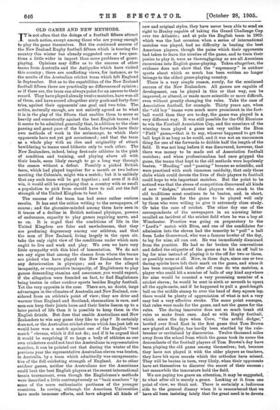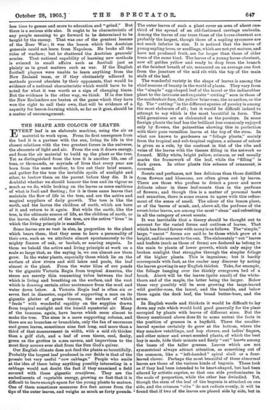I T is not often that the doings of a football
fifteen attract much notice, except among those who are young enough to play the game themselves. But the continued merest; of the New Zealand Rugby football fifteen which is touring the country this winter has already suggested one or two clues- Cons a little wider in import than mere problems of game- playing. Opinions may differ as to the success of other teams from Australia and the Antipodes which have visited this country ; there are conflicting views, for instance, as to the merits of the Australian cricket team which left England in September. But as to the capabilities of the New Zealand football fifteen there are practically no differences of opinion; or if there are, the team can always point for an answer to their record. They have played already twelve matches, have won all of them, and have scored altogether sixty goals and forty-four tries, against their opponents' one goal and two tries. The critics, naturally enough, are not entirely agreed as to what it is in the play of the fifteen that enables them to score so heavily and consistently against the best English teams ; but it seems to be admitted generally that, in addition to the close passing and great pace of the backs, the forwards have their own methods of work in the scrimmage, to which their opponents have not yet got accustomed ; and that the team as a whole play with an élan and originality of attack bewildering to teams used hitherto only to each other. The New Zealanders, indeed, being first-rate athletes in the pink of condition and training, and playing above all with their heads, seem likely enough to go a long way through the season without a defeat. Possibly a picked British team, which had played together for a month or two before meeting the Colonials, might win a match; but it is unlikely that any such team will be got together ; and even if it did win, it would still be surprising that a country with so small a population to pick from should have to call out the full strength of the United Kingdom to beat it.
The success of the team has had some rather curious results. It has sent the critics writing to the newspapers, of course ; and the gloomier-minded among them have seen in it traces of a decline in British national physique, powers of endurance, capacity to play games requiring nerve, and so on. It is urged that the conditions of life in the United Kingdom are false and unwholesome, that they are producing degeneracy among our athletes, and that the men of New Zealand, living largely in the open air, take the only right view of the conditions under which men ought to live and work and play. We own we have very little sympathy with this kind of lamentation. We do not see any signs that among the classes from whom the teams are picked who have played the New Zealanders there is any deterioration in physique; and as for the alleged incapacity, or comparative incapacity, of Englishmen to play games demanding stamina and assurance, you would expect, if the allegation were founded on fact, to find Englishmen being beaten in other outdoor sports besides Rugby football. Yet the very opposite is the case. There are, no doubt, large advantages in the climates of Australia and New Zealand, con- sidered from an athlete's point of view; they are drier and warmer than England and Scotland, rheumatism is rare, and men can keep their joints loose and their limbs lissom up to a later period of life than it is possible to keep them in the English drizzle. But does that enable Australians and New Zealanders to win any game they like to play ? It certainly does not, or the Australian cricket eleven which has just left us would have won a match against one of the English "test match " elevens, which it did not do; and if it be argued that it would be surprising if so large a body of athletes as our own cricketers could not beat the Australians in representative matches, it can be pointed out that during the winter of the previous year the representative Australian eleven was beaten, in Australia, by a team which admittedly was unrepresenta- tive of the full cricketing strength of England. As to other outdoor games, neither the Australians nor the Americans could beat the best English players at the recent international tennis tournament, even though the Englishmen's methods were described a little contemptuously as "back numbers" by some of the more enthusiastic partisans of the younger countries. In rowing, although the American Universities have made immense efforts, and have adopted all kinds of
over the Atlantic ; and at polo the English team in 1902, which was the .last occasion when a series of international matches was played, had no. difficulty in beating the best American players, though the pains which their opponents had taken to learn the niceties of the game, and to train their ponies to play it, were as thoroughgoing as are all American excursions into English game-playing. Taken altogether, the evidence does not show that the " supremacy " in outdoor. sports about which so much has been written no longer belongs to the oldest game-playing country.
There is a very simple reason, surely, for the continued success of the New Zealanders. All games are capable of development, can be played in this or that way, can be improved, or altered, or made more scientific or more difficult, even without greatly changing the rules. Take the case of Association football, for -example. Thirty years ago, when the "old boy" teams were much more prominent in the foot- ball world than they are to-day, the game was played in a very different way. It was still possible for the Old Etonians to win the Football Association Cup, and the members of the winning team played a game not very unlike the Eton " Field " game,—that is to say, whoever happened to get the ball kept it as long as he could, and it was not an uncommon thing for one of the forwards to dribble half the length of the field. It was not long before it was discovered, however, that there was money to be made out of Association football matches ; and when professionalism had once gripped the game, the teams that kept to the old methods were hopelessly beaten. " Heading " and " passing " became so scientific, and were practised with such immense assiduity, that only those clubs which could devote the lives of their players to football could hope to win important matches. But the point to be noticed was that the stress of competition discovered all kinds of new " dodges," showed that players who stuck to the old traditions must continue to be beaten, and, in short, made it possible for the game to be played well only by those who were willing to give it extremely close study. Or take the case of cricket. The other day one of the correspondents of the newspapers in an amusing letter recalled an incident of the cricket field when he was a boy at Winchester. Practice was going on preparatory to the "Lord's " match with Eton, and one of the candidates for • admission into the eleven had the temerity to " pull " a ball from Luke Greenwood, who was a famous bowler of the day, to leg for nine, all run out. He was immediately dismissed from the practice. He had so far broken the conventions and defied the etiquette of the game as to hit an off ball to leg for nine instead of playing it to the off for two or three, or possibly none at all. Now, in these days, since one or two daring spirits have left their mark on the game, and since it has been recognised that after all runs do win matches, a player who could hit a number of balls of any kind anywhere for nine would be counted a very promising member of .a
cricket eleven; he would be sent in sixth or seventh to upset all the apple-carts, and if he happened to pull a good-length ball on the middle stump to over the head of deep square leg, there would be plenty of appreciation of what is not. a very easy but a very effective stroke. The same point emerges, that rules were made for the game, and not the game for the rules. The daring innovator does not so much break old rules as make fresh ones. And so with Rugby football, which since the days when Crew, "the artful, dodger," bowled over Scud East in the first game that Tom Brown
saw played at Rugby, has hardly been startled by the rule-, breaker or revitalised by discoveries. Twelve thousand miles away from the school from which the game took its name the descendants of the football players of Tom Brown's day have been playing the old game among themselves; but, because they have not played it with the older players as teachers,
they have hit upon secrete which the orthodox have missed.. They will be beaten in turn, very likely, when their opponents have set themselves to discover the secret of their success ; but meanwhile the innovators hold the field.
We are paying too grave an attention, it may be suggested, to what after all is merely a game. Looking at it from one point of view, we think not. There is certainly .a- ludicrous side to the general dismay when it is remembered that we have all been insisting lately that the great need is to devote
less time to games and more to education and "grind." But there is a serious side also. It ought to be characteristic of any people meaning to go forward to be determined to be taught by the enemy. That was one of the greatest lessons of the Boer War ; it was the lesson which the Austrian generals could not learn from Napoleon. He broke all the rules of warfare; but he shattered the Austrian generals' armies. That. national capability of learning new methods is evinced in small affairs such as football just as plainly as in great matters such as war. If the English football players were unable to learn anything from the New Zealand team, or if they obstinately adhered to methods proved obsolete by their opponents, that would be evidence of a national characteristic which would have to be noted for what it was worth as a sign of changing times. But the evidence is the other way, we think. If in due time the New Zealanders are beaten at the game which they have won the right to call their own, that will be evidence of a capacity for lesson-learning which, so far as it goes, should be a matter of encouragement.



















































 Previous page
Previous page